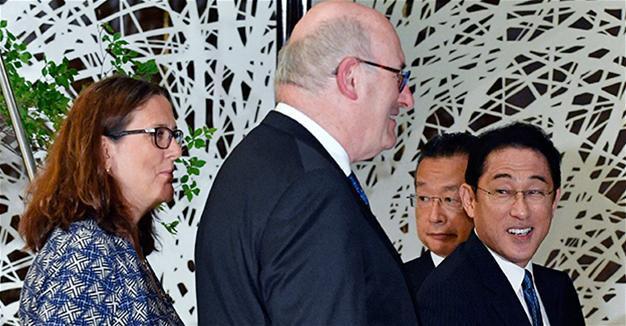EU, Japan schedule summit to strike trade deal
BRUSSELS-Agence France-Presse
 The European Union and Japan will hold a summit on July 6 in hopes of sealing broad agreement on a massive trade deal after four years of tough negotiations.
The European Union and Japan will hold a summit on July 6 in hopes of sealing broad agreement on a massive trade deal after four years of tough negotiations.The landmark deal would mark a big victory for free trade just days before a G-20 summit in Germany in which U.S. President Donald Trump is expected to defend his “America First” protectionist stance.
The hastily-planned Brussels meeting will be attended by Tusk, EU Commission chief Jean-Claude Juncker and Japanese Prime Minister Shinzo Abe and follows weeks of intense negotiations in Tokyo.
The EU and Japanese economies combined account for a colossal 28 percent of global output.
“EU-Japan Summit on Thursday. Ambitious free and fair trade deal in the making,” European Council President Donald Tusk tweeted.
“At the summit, leaders are expected to announce a political agreement on the EU-Japan free trade agreement and the EU-Japan strategic partnership agreement,” a statement said separately.
At this stage, the EU and Japan are expected to reach only a “political agreement” on the trade deal, that would still cover some of the accord’s toughest aspects.
A complete deal would be formally signed later in the year, according to EU plans.
Premier Abe in Tokyo said that the deal was not done and sent Japan’s Foreign Minister Fumio Kishida to Brussels for talks on Wednesday to iron out final differences.
“While staying mindful of the sensitive areas for both sides, I will do everything until the final moment to achieve the best outcome for our national interest,” Kishida said before his departure to Europe.
At the heart of the accord is an agreement for the EU to open its market to the world-leading Japanese auto industry, with Tokyo in return scrapping barriers to EU farming products.
Left untouched would be the controversial investment courts that have stoked opposition to trade deals in the EU nations, including Germany and France.
The deal could be seen as a provocation to Trump who pulled the United States out of the 12-nation Trans-Pacific Partnership this year, in favor of striking country-to-country bilateral deals.
“Clearly, when the US steps back from its historic free trade stance, it creates an opportunity for others,” said Fredrik Erixon, economist and Director of the European Centre for International Political Economy.
“Japan had been holding back on the trade deal with the EU because of the ongoing TPP discussion,” he added.
EU Trade Commissioner Cecilia Malmstroem and Agriculture Commissioner Phil Hogan visited Tokyo last week for two days of urgent talks with Japanese officials.
In Tokyo, Malmstroem said the package would “tear down almost all customs duties between us that are worth a lot of money, billions actually.”
EU exports to Japan overall “could be boosted by one third” and a deal would send a “strong signal to the rest of the world that the EU and Japan believe in free trade,” she said.
Tariffs on European cheese have been a key sticking point in the talks.
Brussels wants Japan to eliminate its 30 percent tariffs on some EU-made cheese, while Tokyo wants duties cut on cars which it exports to the 28-member bloc.
















